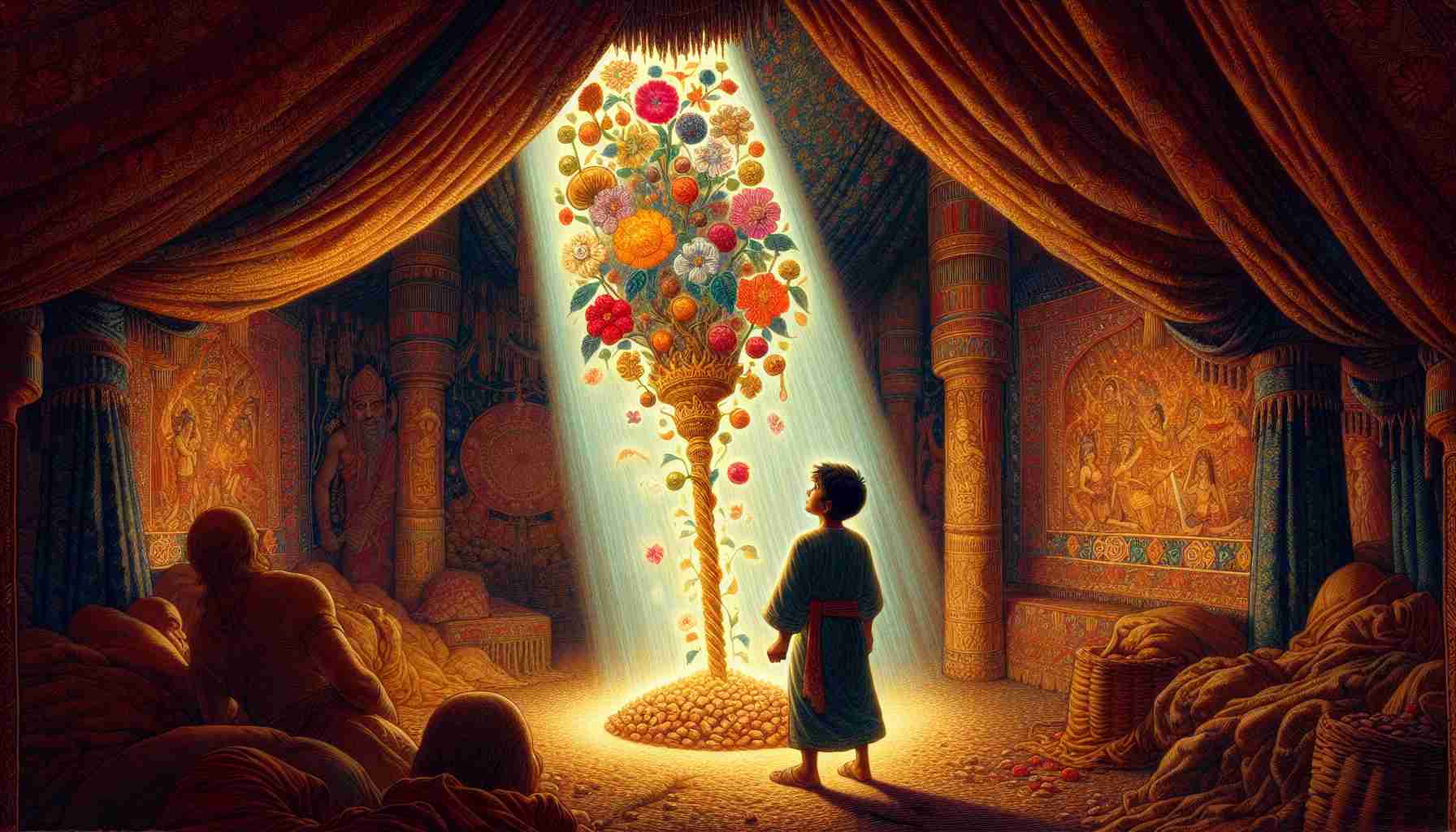

I thought the arguments would never stop.
I was just a boy then, helping my father count the loads of manna we stored in baskets outside our tent in the wilderness. But all around the camp of the Israelites, angry voices buzzed like flies.
“Why should Aharon be the only one?” one man shouted.
It confused me. Aharon — the brother of Moshe (you may know him as Moses), and our Kohen Gadol, the high priest — was the kindest man I knew. He taught the people peace and helped them turn their hearts back to God. But many leaders from other tribes were jealous. They wanted to serve in the Mishkan — the sacred dwelling place for God's presence — like he did.
You won’t find my name in the scrolls. I was one of the tribe of Dan. I wasn’t a leader, just a helper who swept the camp paths and carried water to the elders. But I was there when the Lord settled the matter once and for all.
It was after the rebellion of Korach, when men from the tribe of Levi — and even some from Reuven — tried to take the priesthood from Aharon. The earth swallowed them. Still, doubts remained.
So God gave Moshe a command: each tribal leader should bring a staff — a plain stick of wood, like a shepherd’s rod — and write his name on it. “Write Aharon’s name on the staff of Levi,” God said.
That night, Moshe placed all twelve staffs inside the Holy Tent, where the Ark of the Covenant stood.
I couldn’t sleep. What if nothing happened? What if they continued arguing forever? I hated the way people looked at each other suspiciously now. I missed the feeling of unity, like when we crossed the Sea of Reeds and sang together.
At sunrise, Moshe called us all. I rushed to join the crowd near the Mishkan. My elbows bumped against neighbors as we pressed forward.
Then Moshe stepped out, holding a bundle of the staffs.
“Look,” he said, lifting one high.
I gasped.
It was Aharon’s staff.
Branches had grown from it overnight — fresh green shoots curling out from dry wood. White blossoms dotted the staff like stars, and almond fruit hung from them, ripe and golden.
The crowd fell silent.
We stared, stunned. This dead piece of wood — something lifeless — had bloomed. Only God could do such a thing.
Moshe placed the other staffs down. They were just as dry as before.
“No one can doubt now,” he said. “The Lord has chosen Aharon.”
Some wept. Others bowed. The arguing stopped.
That day, I learned something I never forgot: When the Lord chooses someone, He makes life grow even from bare wood. We may not always understand His choices, but we can trust them.
And from that day forward, when someone questioned why Aharon served, I remembered the blossoms — and how peace returned to our people.
I thought the arguments would never stop.
I was just a boy then, helping my father count the loads of manna we stored in baskets outside our tent in the wilderness. But all around the camp of the Israelites, angry voices buzzed like flies.
“Why should Aharon be the only one?” one man shouted.
It confused me. Aharon — the brother of Moshe (you may know him as Moses), and our Kohen Gadol, the high priest — was the kindest man I knew. He taught the people peace and helped them turn their hearts back to God. But many leaders from other tribes were jealous. They wanted to serve in the Mishkan — the sacred dwelling place for God's presence — like he did.
You won’t find my name in the scrolls. I was one of the tribe of Dan. I wasn’t a leader, just a helper who swept the camp paths and carried water to the elders. But I was there when the Lord settled the matter once and for all.
It was after the rebellion of Korach, when men from the tribe of Levi — and even some from Reuven — tried to take the priesthood from Aharon. The earth swallowed them. Still, doubts remained.
So God gave Moshe a command: each tribal leader should bring a staff — a plain stick of wood, like a shepherd’s rod — and write his name on it. “Write Aharon’s name on the staff of Levi,” God said.
That night, Moshe placed all twelve staffs inside the Holy Tent, where the Ark of the Covenant stood.
I couldn’t sleep. What if nothing happened? What if they continued arguing forever? I hated the way people looked at each other suspiciously now. I missed the feeling of unity, like when we crossed the Sea of Reeds and sang together.
At sunrise, Moshe called us all. I rushed to join the crowd near the Mishkan. My elbows bumped against neighbors as we pressed forward.
Then Moshe stepped out, holding a bundle of the staffs.
“Look,” he said, lifting one high.
I gasped.
It was Aharon’s staff.
Branches had grown from it overnight — fresh green shoots curling out from dry wood. White blossoms dotted the staff like stars, and almond fruit hung from them, ripe and golden.
The crowd fell silent.
We stared, stunned. This dead piece of wood — something lifeless — had bloomed. Only God could do such a thing.
Moshe placed the other staffs down. They were just as dry as before.
“No one can doubt now,” he said. “The Lord has chosen Aharon.”
Some wept. Others bowed. The arguing stopped.
That day, I learned something I never forgot: When the Lord chooses someone, He makes life grow even from bare wood. We may not always understand His choices, but we can trust them.
And from that day forward, when someone questioned why Aharon served, I remembered the blossoms — and how peace returned to our people.